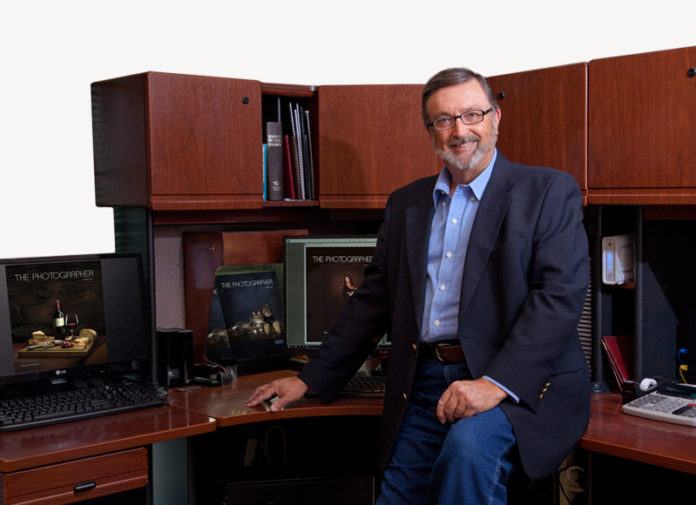Behind-The-Scene Look at the TPPA Magazine
by Steve Kozak
Very few state affiliates of the Professional Photographers of America still publish a printed magazine and even fewer can boast that they have one that serves a six state area and has repeatedly won first place in national competition. The reality of our ever-changing profession has made a printed magazine impractical and unaffordable for nearly everyone. In spite of it all, the Texas Professional Photographers Association long ago realized that a high-quality printed magazine can play a vital role in the association’s success.
If you look inside the covers of most magazines, you will often see the name of its editor(s) along with a production staff who put it all together. However, if you look inside the cover of “The Photographer” magazine, you will see a staff of only one person, Bill Hedrick. Since 1997, he has published this bi-monthly publication which has transformed from a “state magazine into a “regional” magazine.
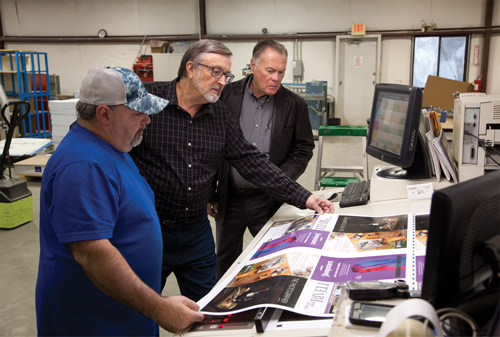
Before he became Texas PPA’s Magazine Editor in 1997, Bill Hedrick operated a studio in the small East Texas town of Kilgore. He opened that business in 1978 with nothing more than some hopes and dreams and soon became one of the leading studios in his part of the state. With a college background in journalism, Bill soon began writing articles for the Texas Professional Photographer and people took notice. By 1993, he was President of the Texas Professional Photographers Association and was the first Master Photographer and Photographic Craftsman in the Kilgore-Longview area. When the previous editor, Walt Hawkins, announced his retirement, Bill was approached about filling Walt’s shoes and he soon sold his studio and took on the duties as TPPA’s Editor.
In the beginning, the “Texas Professional Photographer” magazine had little resemblance to what it is today. It averaged about 24 pages and most of those were in black-and-white. The printing company did the layout and design of the magazine and charged a hefty fee to do so. Within his first year on the job, Bill “computerized” the design of the magazine and took over much of the work previously done by the printing company, saving Texas PPA over $10,000 in production costs. Within a couple more years, he had doubled the advertising revenue and the magazine gradually became a 100% color publication that began winning first place in national competition with the Professional Photographers of America.
The biggest challenge to a publication like ours is its expense and most state affiliates of the Professional Photographers of America have long since abandoned their efforts to maintain one. Those who advertise today are much more selective in how they spend their advertising dollars and “state” magazines were low on their lists. A “regional” magazine would give advertisers more value and, when the Southwestern Photographers Association decided to cease production of their printed magazine, the Texas Professional Photographers Association decided to “go regional” and take up the slack. Today, state affiliate members of Texas, Louisiana, Arkansas, Oklahoma, New Mexico, and Colorado receive our magazine.
A couple of years ago, Bill Hedrick proposed a way to make the magazine even more attractive to advertisers. First, the name of the publication would be changed to “The Photographer,” allowing it to truly be “regional” and to prove to advertisers that it is not simply a “state newsletter.” Next, Bill came up with an innovative way for other affiliates anywhere in the United States to adopt the magazine as their own “official” publication. By carefully designing the layout of an issue, the printer could simply change out eight pages so that each participating affiliate could have their own material. The rest of the magazine would be same for everyone. With a simple “turn-key” price, a printed magazine could be affordable to associations anywhere in the United States and would not cost Texas PPA any money.
The primary role of “The Photographer” magazine, as prescribed in the Texas PPA bylaws is “communicating with its members and promulgating technical information for educational purposes” and our magazine does an amazing job of doing just that. But the officers of Texas PPA also realized how useful it can be as a membership recruitment tool. In the State of Texas, there are a significant number of photographers who are not (yet) members of Texas PPA. Realizing that such individuals were excellent prospects for membership, TPPA staff members came up with a way to promote our association to them by mailing each one of them a complimentary copy of “The Photographer.” While other state affiliates are experiencing a decline in membership, Texas PPA is actually growing because of this pro-active approach.
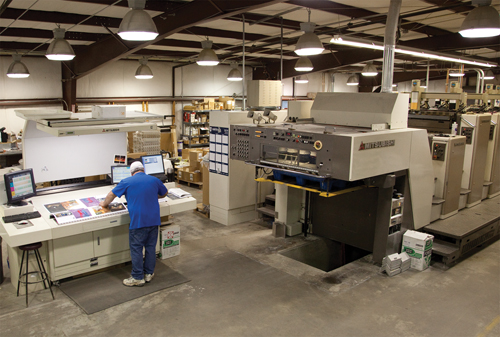
But the key to publishing a quality magazine like “The Photographer” is securing advertising dollars to help with the cost of it. Today’s advertisers are more demanding than ever and expect something in return for their investment. Because of this, Texas PPA goes beyond the printed pages to provide advertisers with the best return possible on their advertising dollars.
In addition to the printed version, “The Photographer” is published in a digital format. The digital version of the magazine reaches thousands more readers worldwide. “ThePhotographerOnline.com” was created to reach more readers and to give advertisers even more exposure. All magazine advertising is carried over in the digital version with links to each advertiser’s website.
In fact, this expanded readership has grown quite impressively, creating even more value for our magazine advertisers. In one year since placement on ISSUU.com, world-wide readers have viewed over 270,000 pages of the magazine. When readers access the magazine website, they also find archived issues of the magazine going back several years as well as links to advertisers’ websites. Vendors can also find advertising specs, rates, and deadline information. As a bonus, digital advertising is free to those who advertise in the magazine.
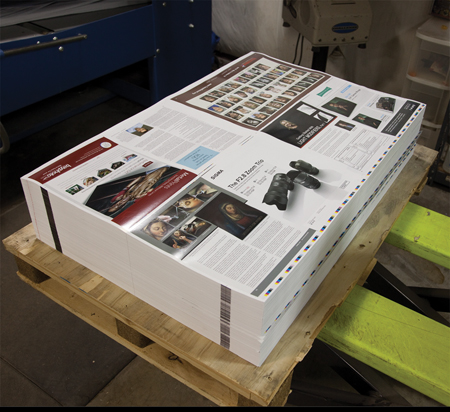
Since the beginning, putting together each issue of “The Photographer” has been a one-man-show. While similar publications have a staff, Bill Hedrick does it all… gathering articles, writing others, selling and collecting the advertising. He designs the entire layout and sends a finished file to Complete Printing & Publishing in Carthage, Texas. “This is a first-class facility and I deal directly with the owner of the company,” explains Bill. “We may not be their largest client, but they sure treat us as if we were.”
Complete Printing & Publishing has the only 6-color, 40 inch press in the Ark-La-Tex area, a Mitsubishi press costing a whopping $2.2 million. But the press is just one step of the process. “We typically send about a 100 megabyte portable document file (PDF) of the magazine to the printer who will digitally print a color “proof” of the magazine for final corrections. Color calibration between Bill’s computer and the printer’s computer is constantly monitored for accuracy. When the proof is approved, printing plates are prepared and it is ready for press. “The concept of offset printing is different from what we’ve all been accustomed to when dealing with labs who print our photographs,” says Bill. “All of the colors we see in the pages of the magazine are actually a combination of cyan, magenta, yellow, black, and shades of those basic colors.”
Once the printing plates go to the press, there is a great deal of monitoring of registration and color, all of which is done by a computerized system operated by the pressman with the press making the necessary corrections throughout the entire process. “It’s all very high-tech,” explains Bill.
A typical magazine is actually several sections (called “signatures”) that are individually printed, folded, stacked together, stapled, and trimmed to make the final product we see each issue. Each signature is a sheet of paper, roughly 24 x 36 inches, with eight pages on one side and eight pages on the other. “You have to design the layout in increments of four pages. You can’t simply add or subtract one or two pages.”
The cover of the magazine is printed on a heavier stock paper than the rest of the magazine and gets a special UV coating for that unique and classy gloss look. It is also shipped directly from the printer who has their own in-house mail service. “We provide them with the mailing lists and they put address labels on the dust covers of each magazine before taking them to the Post Office.” Incidentally, the six state distribution of our magazine is a key part of our TPPA membership drive.
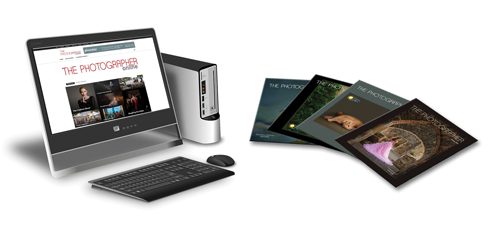
In addition to “The Photographer” Magazine itself, Complete Printing & Publishing also prints other promotional material for Texas PPA, including the Summerfest booklet and the Texas School Course Guide. Their service is fast yet thorough and a tremendous amount of personal attention to detail goes into each publication. “It is a large enough operation to provide unparalleled quality yet small enough to where staff and employees know me on a first name basis,” says Bill
Articles in “The Photographer” Magazine come from contributors around the United States and abroad. One contributor from Africa read the magazine online and submitted an article that was published a little over a year ago. Others come from writers in England and Canada.
But there is a lot of talent right here in Texas and our own members write many of the articles. “You don’t have to be a professional writer, either,” Bill explains. “Many times someone will come to me with a general concept and I’ll work with them closely on it. By the time it is done, it is a well-written and informative article.” That’s what makes our magazine so unique… a personal connection with our own members.
It is all a well-organized operation run by one man who makes it all look so easy. The truth is that Bill Hedrick puts his heart into every issue that goes out on-time, every time. The officers of Texas PPA approve a budget for the magazine each year and it is his job to provide the best possible publication while working within those budget guidelines. In his 22 years as TPPA Editor, he’s never let us down and has always made us proud.



